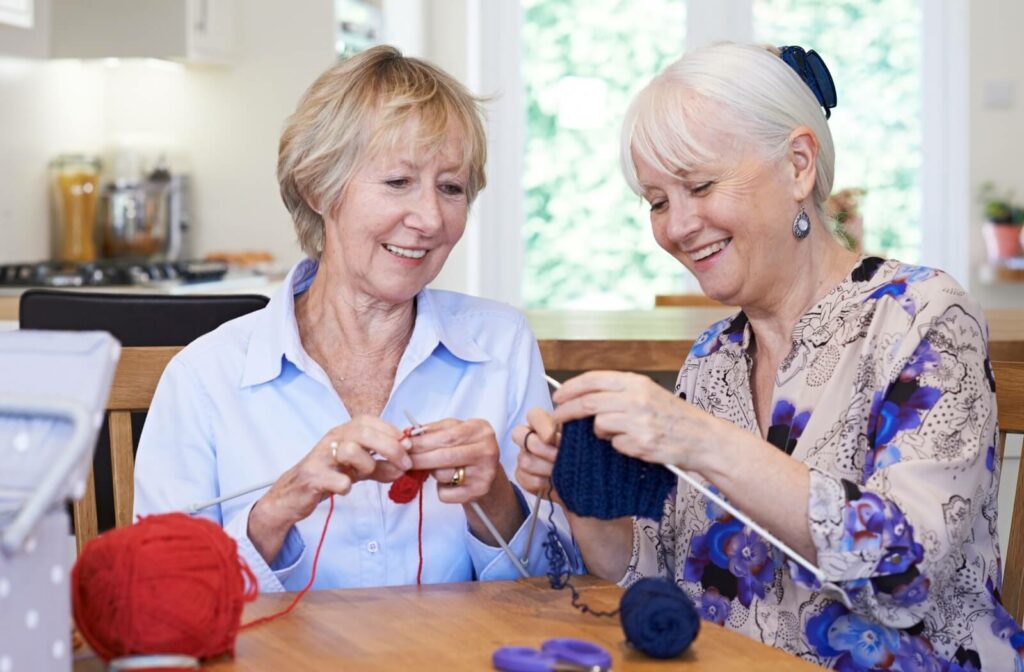One of the most effective ways to enhance the quality of life of a loved one with dementia is through meaningful and stimulating activities like painting, gardening, video call visits with loved ones, making memory boxes, or tasting foods with friends. These activities provide joy and purpose, slow cognitive decline, and strengthen emotional bonds.
Why Engaging in Stimulating Activities Matters
For people with dementia, engagement in activities goes beyond mere leisure. It’s a form of therapy that positively impacts emotional, mental, and physical well-being. In fact, stimulating activities can:
- Boost Mood: Activities can reduce anxiety, irritability, and depression, which are common in dementia.
- Enhance Cognitive Function: Maintaining a stimulating routine can improve memory, logical thinking, and decision-making skills for extended periods.
- Encourage Social Interaction: Group activities foster connections and create opportunities for laughter and joy.
- Promote Physical Health: Active participation in activities, even seated activities, can improve coordination and balance.
- Provide a Sense of Independence: Simple yet purposeful tasks allow people with dementia to feel productive and valued.
With these benefits in mind, it’s clear that structured activities tailored to your loved one’s capabilities can significantly enhance their quality of life.
15 Activities for Seniors With Dementia
Different people enjoy different things. This is no less true of our loved ones with dementia. Here are fifteen activities, divided into 5 categories, designed to inspire meaningful engagement. We’ve included practical examples that can help spark ideas for what you can do with your loved one based on their interests.
Creative Activities
Tap into your loved one’s artistic side! Creativity is therapeutic and fosters self-expression.
- Painting or Coloring: Use watercolor paints or coloring books to encourage artistic exploration—no “perfection” is required.
- Crafting: Simple activities like making greeting cards or beading bracelets can boost motor skills and provide a sense of accomplishment.
- Music: Playing familiar tunes from your loved one’s past or creating music with small instruments like tambourines can be incredibly uplifting.
Fulfilling Activities
Meaningful tasks that align with your loved one’s past interests or daily routines can provide them with purpose.
- Gardening: Planting seeds, watering plants, or removing weeds can rekindle a love for nature.
- Baking: Kneading dough, sprinkling toppings, or mixing ingredients can be nostalgic and stimulating for the senses.
- Household Chores: Folding towels or arranging flowers are simple yet fulfilling tasks that are easy to accomplish.
Technology-Based Activities
Modern technology isn’t off-limits for seniors with dementia! With the right tools, you can enhance their engagement with fun activities.
- Digital Games: Apps like “Lumosity” or “MindMate” provide brain games tailored to varying cognitive abilities.
- Video Calls: Connecting with family via Zoom or FaceTime helps maintain social bonds when in-person visits aren’t possible.
- Memory-Triggering Tools: Tablets loaded with old photos or home videos can spark smiles and conversations.
Reminiscent Activities
Revisiting cherished memories can comfort a loved one with dementia and strengthen emotional bonds.
- Photo Albums: Flip through family photos together and encourage storytelling.
- Music of Their Era: Create a playlist of your loved one’s favorite songs to evoke positive memories.
- Memory Boxes: Fill a box with personal memorabilia like postcards, awards, or trinkets.
Sensory Activities
Sensory stimulation can be deeply comforting for those with cognitive impairment.
- Touch: Provide textured objects like soft blankets, stress balls, or sandpaper to explore via touch.
- Scent: Familiar scents like lavender, baked cookies, or fresh flowers can soothe and uplift the spirit.
- Taste: Organize a small tasting session featuring sweet, salty, and savory items to enjoy together.
Adapting Activities as Dementia Progresses
As dementia advances, activities that once brought joy may need to evolve. Here’s how to adapt based on different stages of cognitive decline:
- Early Stage: Focus on more complex activities like board games or book club discussions while remaining mindful of challenges like slow processing.
- Mid Stage: Gradually transition to more straightforward tasks, such as large-piece puzzles, knitting, or group singalongs.
- Late Stage: Prioritize sensory-rich stimulation, such as hand massages, calming music, or playing with soft, textured objects.
Tip: Pay attention to your loved one’s responses. If they seem frustrated or uninterested, gently switch to a more straightforward or familiar activity.
Tips for Planning Dementia-Friendly Activities
It’s essential to approach activities with thoughtfulness and flexibility. Here are some guidelines to help you plan effectively:
- Consider Ability Levels: Choose tasks suited to your loved one’s cognitive and physical abilities.
- Stick to a Routine: Regular, familiar activities create a comforting sense of structure.
- Be Patient and Supportive: Offer guidance as needed but allow them to complete tasks independently whenever possible.
- Limit Distractions: A quiet, organized environment fosters focus and enjoyment.
- Celebrate Small Wins: Every accomplishment is meaningful, no matter how small it may seem.
Dementia Care Activities in Memory Care
If your loved one is in or considering a memory care community, rest assured that activities designed specifically for dementia care are often a staple. Professionals in these environments plan engaging and therapeutic options that cater to every stage of cognitive decline.
Here’s a glimpse at some common offerings in memory care facilities:
- Group exercise classes, such as chair yoga.
- Pet therapy sessions with trained animals.
- Gardening in secure outdoor spaces.
- Specialists lead art therapy programs.
These programs foster community connections while providing personalized care.
Maumee Pointe knows that stimulating activities are more than just something to pass the time—they’re a way to foster joy, create meaningful connections, and enrich the daily lives of individuals with dementia. Contact us today to see how our memory care community can bring creative outlets and sensory experiences into your loved one’s life.

